The circumstances being experienced by Coloradans now and in the coming weeks are unprecedented. We are already seeing responses from all levels of government, and foundations and individuals across Colorado are stepping up to participate in a significant way. We know that philanthropy cannot solve all of our challenges, but we can make a difference by helping to address impacts and support organizations that have been our long-term partners.
Today, Gates Family Foundation is announcing new commitments of $1.61 million toward COVID-19 Rapid Response, which includes $610,000 in direct grants and a $1 million program-related investment (PRI) to support the State of Colorado’s efforts to secure personal protective equipment for frontline health care workers. (Update: This $1 million PRI toward PPE was ultimately released and no capital was deployed.) This is in addition to our previously announced $250,000 contribution to the statewide nonprofit grants pool managed by the Mile High United Way.
We expect to announce additional COVID-19 response grants and mission-related investments in the coming weeks and months.
IMMEDIATE NEEDS – RAPID RESPONSE TO NONPROFITS
- Mile High United Way COVID-19 Response Fund – $250,000 to the State of Colorado’s collective response fund, managed by Mile High United Way
IMMEDIATE NEEDS – PUBLIC HEALTH RESPONSE
- Colorado Center for the Advancement of Patient Safety (Colorado Hospital Association) – $40,000 to support the production and delivery of masks to rural health care facilities throughout the state. The masks are being made by two Colorado social enterprises that employ refugees and other individuals from vulnerable populations.
- University of Colorado Foundation – $30,000 to build a website to be used as a tool for managing data, monitoring trends, projecting near-term conditions, and informing decisionmakers and the public.
IMMEDIATE NEEDS – FOOD SECURITY
Gates has committed a total of $175,000 to support a variety of organizations around the state that are addressing food insecurity needs, primarily in low-income communities. We are making contributions to three collective response vehicles; seven partner school districts spearheading food distribution; three food banks that support school food programs as well as serve the larger community; and five smaller organizations that have been long-time Gates grantees associated with our urban food work though our community development program.
Collective Response
- Colorado COVID-19 Hunger Relief Fund – $40,000 to Colorado Blueprint to End Hunger’s statewide fund, which serves schools, food banks, and a variety of other food resources
- Denver Metro Emergency Food Network – $15,000 to deliver free, prepared meals to homebound families and elderly individuals in need
- Colorado Restaurant Response – $10,000 to a relief program hosted by Colorado Succeeds, working with a variety of partners and the Denver Metro Emergency Food Network to offer support to laid off restaurant and hospitality workers and provide food to all kinds of people in need
School Districts
- Alamosa School District – $5,000
- Archuleta School District – $3,500
- Cañon City School District – $5,000
- Cotopaxi School District – $2,000
- Fremont RE-2 School District – $2,500
- Lake County School District – $3,000
- Silverton School District – $1,500
Food Banks
- Care and Share – $25,000 to a food bank that serves school districts in eastern and southern Colorado
- Food Bank of the Rockies – $25,000 to one of the largest food banks in the state, and also a partner in serving high-poverty school district food programs in the metro area and elsewhere
- Pine River Shares – $5,000 to a smaller food bank that partners with the Bayfield and Ignacio School Districts
Partner Organizations
- GrowHaus – $5,000 to an urban food and nutrition program in Denver’s Globeville neighborhood
- La Puente – $10,000 to an all-purpose social service organization in Alamosa that also grows food and operates a food bank
- Sun Valley Kitchen and Community Center – $2,500 to a community food program in Denver’s Sun Valley neighborhood
- Re:Vision – $5,000 to a community food program in Denver’s Westwood neighborhood
- Rio Grande Headwaters Land Trust – $10,000 to the Local Farms 2 Local Families program, which makes local food available at no cost to local people in need in the San Luis Valley
IMMEDIATE NEEDS – VULNERABLE POPULATIONS
Our most pressing concern as a society is to assist populations that will be most vulnerable to the health risks and economic impacts of the current crisis. People experiencing homelessness cannot practice social distancing in many cases, immigrant communities may struggle to navigate sources of help, and low-income families across Colorado are among the first feeling economic impacts. By committing a total of $160,000 to organizations that are well-positioned to meet the needs of these individuals and communities, we can help support Colorado’s most vulnerable populations.
Collective Response
- Ayuda Colorado Fund – $25,000 to the Latino Community Foundation of Colorado’s fund to support Latino-led and Latino-serving nonprofit organizations and immigrant and refugee serving organizations
Essential Service Providers
- Colorado Coalition for the Homeless – $50,000 to the state’s largest provider of housing and health care for people experiencing homelessness
- Family Resource Centers – $45,000 to a statewide network of resource centers providing a wide variety of services to vulnerable individuals and families
- Urban Peak – $15,000 to a shelter operator and service provider that works with youth 15-24 experiencing homelessness
Smaller Partner Organizations
- La Puente – $12,000 to an all-purpose social service organization in Alamosa that operates a shelter facility and is the primary organization serving vulnerable populations
- The Delores Project – $5,000 to a Denver organization serving vulnerable populations
- RISE Colorado – $8,000 to an organization with deep connections to immigrant and refugee populations in Aurora
SYSTEMIC PARTNER SUPPORT
- Arts and Culture Fund – $100,000 to help establish a new fund with Bonfils-Stanton Foundation to support nonprofit organizations in the arts and culture sector.
- Center for Community Wealth Building – $25,000 to a Gates partner working with small entrepreneurs from low-income communities. Among their areas of focus is linking these types of local entrepreneurs to anchor institutions (hospitals, universities, and other similar entities) that have a large and consistent need for good and services. In response to the current crisis, the Center is supporting a cohort of entrepreneurs trying to pivot to serve other needs and sources of demand that may emerge in the current circumstances.
- Colorado Farm and Food System Fund – $80,000 to an effort being advanced by a large coalition of organizations statewide, including multiple Gates partners such as LiveWell Colorado, Rocky Mountain Farmers Union, and the National Young Farmers Coalition. It is anticipated that smaller agricultural producers that rely on public markets, farm to school programs, and other non-commodity market mechanisms will be impacted by disruptions in the marketplace. This coalition is beginning work now to develop ways to support these more vulnerable producers and create alternative mechanisms for these farmers and ranchers to get their products to market and take advantage of other support mechanisms that may become available.
- Informed Communities Fund – via an existing operating grant to Colorado Media Project, to help establish a fund at Rose Community Foundation to ensure that the state’s diverse racial/ethnic communities, immigrant and refugee populations, and low-income rural communities are receiving accurate, localized, and actionable information on the continuously evolving COVID-19 public health and economic crises. The fund also supports collaborative reporting and story sharing efforts initiated by the Colorado News Collaborative’s new COVID-19 Coverage Network, which involves more than 40 newsrooms statewide in sharing daily coverage and in-depth reporting from the front lines, and underwrites technical assistance for small, local media businesses in need of support.


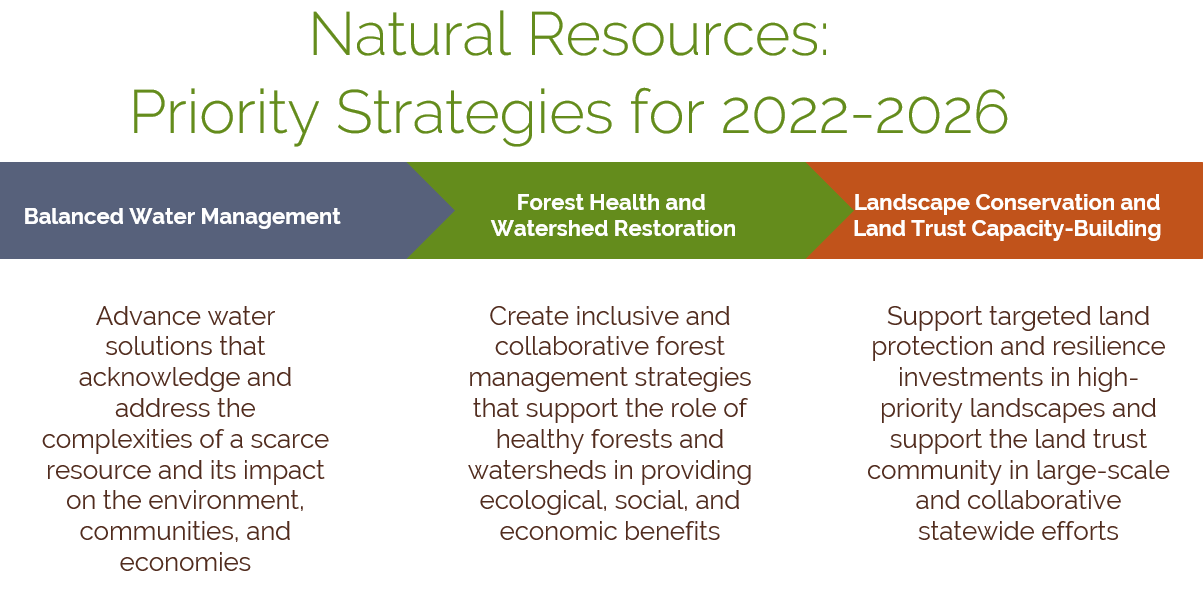

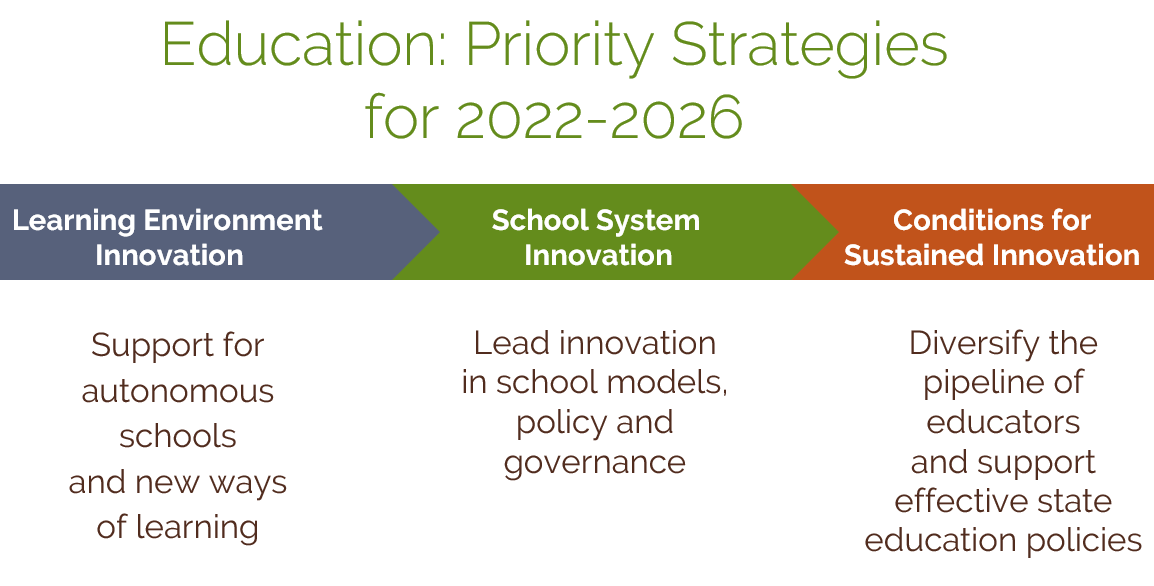

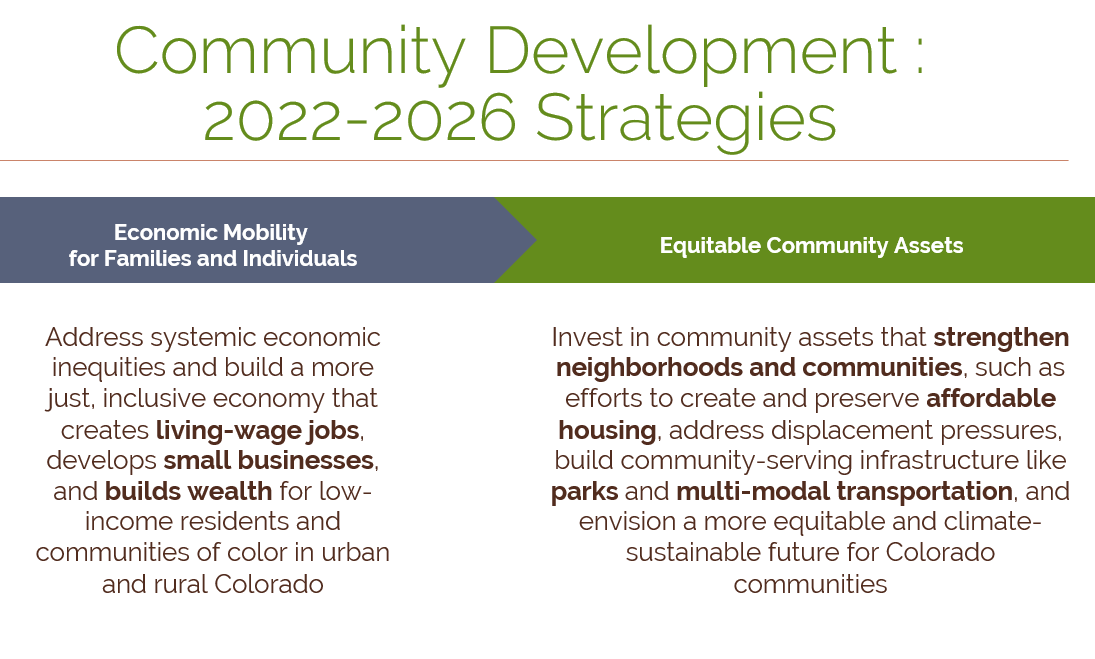

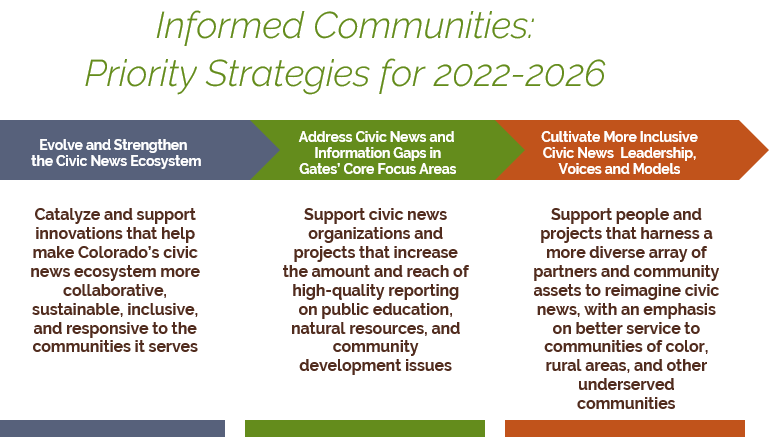
 Finally, also in 2023 a total of $410,956 previously committed by Gates to the
Finally, also in 2023 a total of $410,956 previously committed by Gates to the 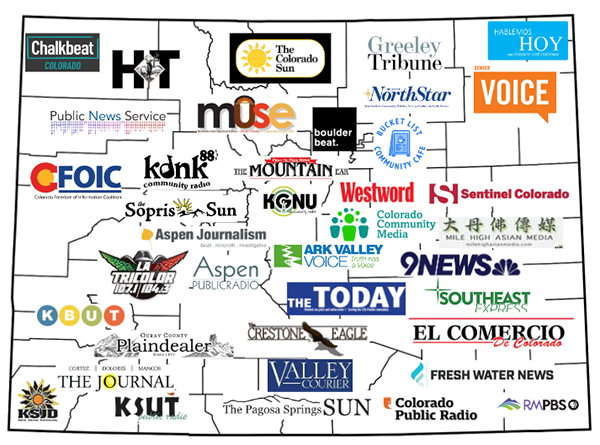 A total of $1,110,956 committed to the
A total of $1,110,956 committed to the 
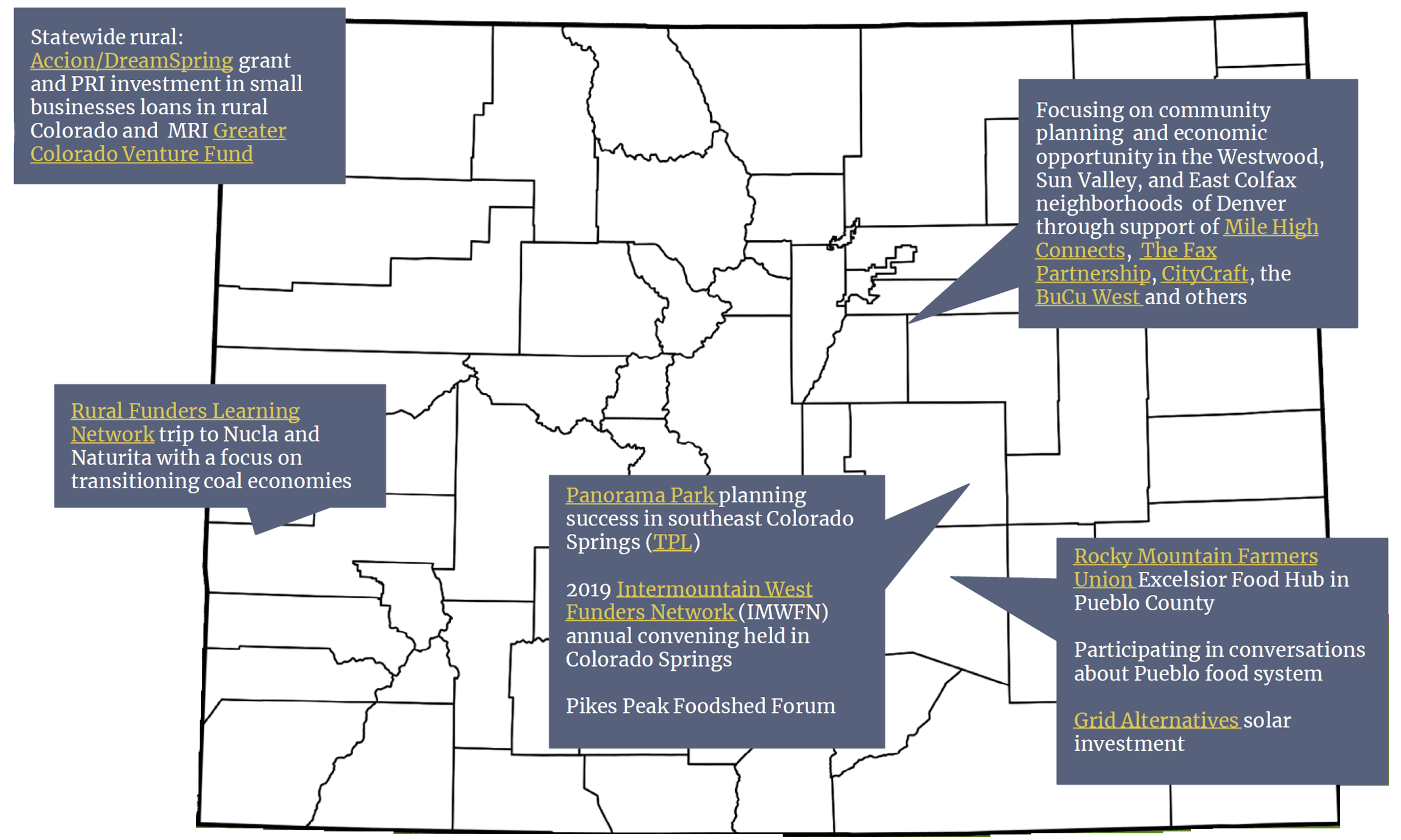 In 2019, the Community Development program committed $932,500 in strategic grants to 13 organizations and $465,000 in responsive capital grants to 12 organizations. New impact investments supporting vibrant communities in 2019 included a $500,000 MRI to
In 2019, the Community Development program committed $932,500 in strategic grants to 13 organizations and $465,000 in responsive capital grants to 12 organizations. New impact investments supporting vibrant communities in 2019 included a $500,000 MRI to 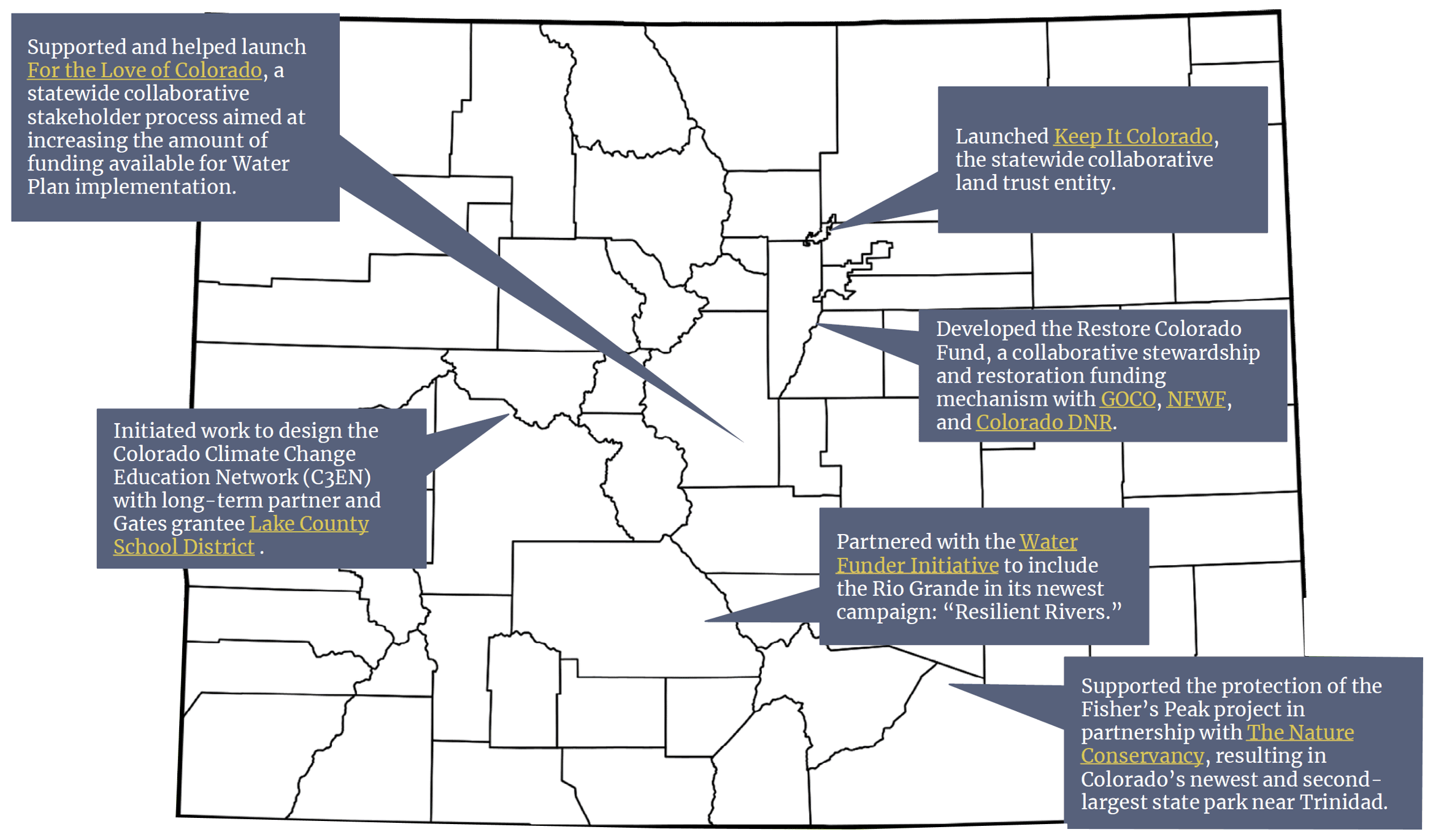 Our Focus Landscapes initiative, a key element of our Natural Resources program, underwent a comprehensive review, revision, and re-launch in 2019. This initiative was launched in 2011 to help Colorado achieve landscape-scale conservation through the protection of private lands in specific geographies. A great deal of progress was made in North Park, southeast Colorado, and the San Luis Valley, resulting in more than 200,000 acres of farm and ranch lands conserved, along with their associated ecological values. The strategic review process was done in close partnership with the land trust organizations representing those geographies, providing lessons-learned and an exploration of emerging opportunities. The revised Focus Landscapes initiative will first focus on two geographies:
Our Focus Landscapes initiative, a key element of our Natural Resources program, underwent a comprehensive review, revision, and re-launch in 2019. This initiative was launched in 2011 to help Colorado achieve landscape-scale conservation through the protection of private lands in specific geographies. A great deal of progress was made in North Park, southeast Colorado, and the San Luis Valley, resulting in more than 200,000 acres of farm and ranch lands conserved, along with their associated ecological values. The strategic review process was done in close partnership with the land trust organizations representing those geographies, providing lessons-learned and an exploration of emerging opportunities. The revised Focus Landscapes initiative will first focus on two geographies: